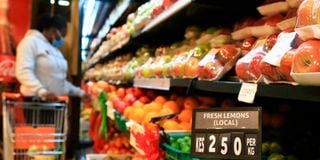Premium
Life to get tougher for more Kenyans, MPs’ report reveals

A customer picks fruits at a Naivas supermarket in Nyeri. Inflation has breached the projected maximum of 7.5 per cent over the last several months. In August, inflation was at a historic 8.5 per cent.
What you need to know:
- Inflation has breached the projected maximum of 7.5 per cent over the last several months.
- Food and fuel prices, which are at the centre of Kenya’s inflation crisis, could go higher on account of local and international events that are beyond its control.
- The rains have come nearly a month late which means farmers will also harvest late.
An unholy trinity of delayed rainfall, the Russia-Ukraine war and a weak shilling are likely to push more Kenyans into poverty, a parliamentary report has revealed.
The Parliamentary Budget Office in its forecast of the 2022-2023 budget year says that food and fuel prices, which are at the centre of Kenya’s inflation crisis, could go higher on account of the local and international events that are beyond its control.
Inflation has breached the projected maximum of 7.5 per cent over the last several months. In August, inflation was at a historic 8.5 per cent.
Rainfall
A government move to release 1.5 million bags of subsidised fertiliser in September appeared timely, as the meteorological department had projected that the short rains season would start in October and end in December.
But the rains have come nearly a month late which means farmers will also harvest late, if the skies are to remain open long enough to irrigate agricultural produce across the country.
For Kenyans, this means that food prices may remain high for a longer time.
One of the country’s worst drought spells in four decades has already thrown an estimated four million Kenyans at risk of starvation, with President William Ruto directing his administration to dedicate Sh2 billion towards fighting starvation.
The Parliamentary Budget Office has warned that Kenya has already exhausted the billions that were allocated to food and fuel subsidy programmes.
“These drought conditions appear likely to persist for the rest of the year as the meteorological department predicts below-average rainfall in the October to December 2022 short rains season. The government is therefore expected to provide adequate resources not only towards drought mitigation measures such as relief food but also towards long-term food security measures…”
“…It is noted that these were not adequately prioritised in the 2022/2023 budget. The allocation for the government subsidy programmes on food and fuel had also been exhausted before the end of the financial year,” the Parliamentary Budget Office says in the report.
As the food crisis rages on, fuel prices are expected to remain at a historic high following the eight-year-old war between Russia and Ukraine, which escalated in February.
Russia’s move to invade Russia in February saw several countries hit it with trade sanctions. Kenya relies on Russia for the import of wheat, fertiliser, iron, steel and paper.
The food, agriculture and construction industries have taken a big hit in the last eight months.
Oil
Russia is also one of the world’s top crude oil suppliers and trade sanctions against it have created the demand for oil from other countries which has in turn pushed up the commodity’s cost.
For Kenyans, this means the cost of fuel locally will remain high in the course of the war, which will increase transport costs.
Ukraine has also struggled to trade with other countries, making things harder for Kenya which relied on her for cereals, and animal and vegetable oils.
Inflation has also hit the United States hard, forcing the country to raise its interest rates. This has seen most currencies weaken against the dollar, which is largely used to trade on the global market.
In Kenya, this means that the cost of imports, whether by the government or private sector, has also gone up.
“This business environment has been complicated by the fact that the Covid-19 global pandemic had already created business challenges in the manufacturing and hospitality industries that were just starting to recover before the Ukraine-Russia conflict,” the report states.
“Higher inflation is likely to erode the purchasing power of consumers leading to a slowdown in consumption and overall economic activity. The impact will be disproportionately felt among the lower-income earners who may then be pushed further into poverty,” the report adds.
Averting the crises knocking on Kenya’s doors requires money, which the country does not have.
The Parliamentary Budget Office says that debt repayments will burden President Ruto’s administration.
In the current financial year, Kenya’s debt repayments have increased from Sh850 billion to Sh1.3 trillion. The figure is expected to increase to Sh1.8 trillion in the 2023-2024 financial year.





